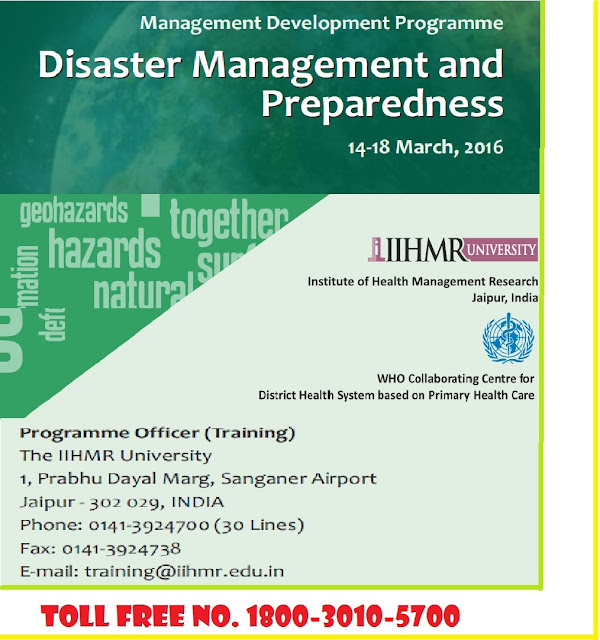IIHMR University
responds WHO’s finding of 10% of patients worldwide are affected due to errors
in medical care
Conducts a training programme on
Patient Medication Safety and Communication Skills for Hospital Pharmacists
Jaipur, January
12, 2016: Unsafe
use of medication is a major issue in health care in both developed and
developing countries, causing millions of patient injuries and costing billions
of dollars to health-care systems. WHO reports that 10% of patients
worldwide are affected due to errors in medical care. This also estimates
that in developed nation between 7.5% and 10.4% of patients in acute care
settings and 13% in ambulatory settings experience adverse drug events. The
financial burden of these errors is as high as US$ 4 billion a year, not
counting lost wages, productivity or additional health-care costs. Hence this
similar level of harm from unsafe medication is prevailed in both developed and
developing nations which confirm that patient medication safety and quality
management is a global priority.
The IIHMR
University, Institute of Health Management Research, Jaipur has been
contributing towards this very topical issue of international importance
through its flagship yearly WHO sponsored International Courses in Promoting
Rational Drug Use in Communities (PRDUC) for last 11 years. Following the need
of communication skills amongst the hospital Pharmacists, The India Institute
of Health Management and Research, University (IIHMR), Jaipur has initiated a
Management Development Programme on ‘Patient Medication Safety and Communication Skills
for Hospital Pharmacists’
Speaking about
this Management Development Programme Dr. SD Gupta, President, IIHMR
University said, “The adverse drug events and medication errors cause
significant health and economic repercussions both in developed and developing
countries. Therefore a global concerted effort is needed to address patient
medication safety and it needs by involving all healthcare stakeholders,
including patients. Communication has become the buzzword for healthcare
professionals, in part due to the overwhelming reports of medication misuse.
According to a healthcare research report majority of population are failing to
comply some way with their medication regimens. Better communication skills in
pharmacy practice enhance the pharmacist's ability to develop professional
relationships with their patients, co-workers and other healthcare providers to
optimize health care. . To addresses the issues related to Patient medication
safety and medicines management, a Management Development Program on
"Patient Medication safety and Communication Skills for Hospital
Pharmacist" is being organized at IIHMR from January 11-15, 2016.”
Abhishek
Dadhich, Assistant Professor and Programme Co-coordinator, IIHMR University
said,
“This program is designed for public health professionals and pharmacists
currently holding positions of responsibility within health systems. The
objective of the management development programme on Patient Medication Safety
and Communication Skills for Hospital Pharmacists is to enable participants
understand the concepts and need of medication safety culture in
organization, develop error-reduction strategies around the use of
high-alert medications, The program enable participant to make effective
communication techniques to prevent human error while patient medication is
going on, The program also focus on how to promote two-way communication
with patients and health care professionals and enable participants to identify
common barriers to verbal communication and describe ways to overcome each
barrier.”
The program will
use a mix of lecture by resource persons to introduce the lead concept and
encourage active
interaction by the participants through classroom discussions, group work
and
presentations.


